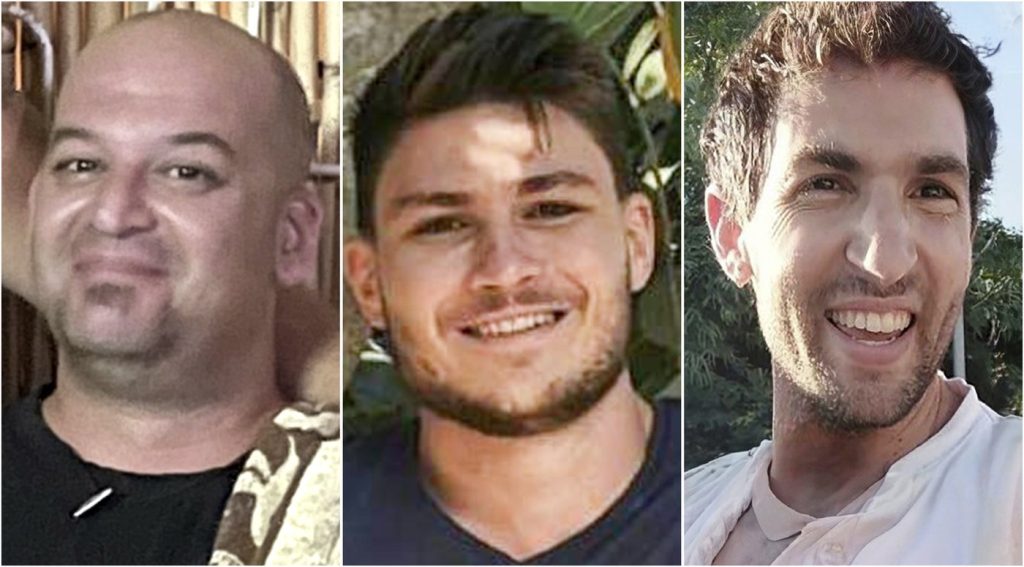DEIR AL-BALAH, Gaza Strip (AP) – Three more Israelis held captive in the Gaza Strip are on the verge of being freed on Saturday as part of a fragile ceasefire deal that mandates Israel to release hundreds of Palestinian prisoners in exchange. This truce commenced nearly four weeks ago but has faced numerous challenges, including a recent tense dispute that threatened to reignite hostilities.
U.S. President Donald Trump's controversial proposal to resettle over 2 million Palestinians from Gaza has further complicated the ceasefire's future. Despite these complications, Hamas announced it would proceed with the release of more hostages following negotiations with Egyptian and Qatari officials. The mediators have assured that all barriers would be removed to facilitate the entry of tents, medical supplies, and other essential items into Gaza.
The three hostages slated for release after more than 16 months in captivity are Iair Horn, 46, a dual citizen of Israel and Argentina; Sagui Dekel Chen, 36, an American-Israeli; and Alexander "Sasha" Troufanov, 29, who holds both Israeli and Russian citizenship. They were all abducted from Kibbutz Nir Oz during the Hamas-led attack on October 7, 2023, which marked the beginning of the ongoing conflict.
According to the Hamas-linked Prisoners' Information Office, 369 Palestinians are expected to be released from Israeli prisons. Among them, 36 individuals are serving life sentences. This will mark the sixth exchange since the ceasefire took effect on January 19. So far, a total of 21 hostages and over 730 Palestinian prisoners have been released in this initial phase of the truce.
The hostages Horn, Dekel Chen, and Troufanov were captured in Kibbutz Nir Oz, a community severely impacted during the October 7 assault. Horn was taken alongside his brother Eitan, who continues to be held captive. Dekel Chen was working outside when the militants attacked, while his wife and their daughters sheltered in a safe room. Troufanov was captured with his grandmother, mother, and girlfriend; the three women were released during a brief ceasefire in November 2023.
Among the notable Palestinian prisoners set for release is Ahmed Barghouti, 48, a close aide to Marwan Barghouti, a prominent militant leader and Palestinian political figure. Ahmed Barghouti is serving a life sentence for orchestrating attacks during the Second Intifada, resulting in the deaths of Israeli civilians.
Concerns are rising regarding the condition of the remaining hostages. Out of the 251 individuals who were abducted, 73 remain in Gaza, with reports suggesting that around half are believed to be deceased. The situation of the remaining captives has garnered increasing attention, especially after three hostages appeared frail and emaciated upon their release last week. One released captive, Keith Siegel, 65, revealed in a video message the harsh treatment he endured, including being beaten by his captors.
The ceasefire remains precarious. Recently, Hamas threatened to delay further hostage releases, accusing Israel of violating agreement terms by not permitting sufficient humanitarian aid deliveries into Gaza. In response, Israel indicated that unless hostages were freed, it would resume military operations. While the immediate crisis has been averted, the future of the truce is uncertain, especially with the first phase set to conclude early in March. There has been little progress in negotiations for the next phase, where Hamas would release all remaining hostages in exchange for a cessation of hostilities.
As the conflict reached its peak, around 90% of Gaza's 2.3 million population was displaced. Hundreds of thousands have returned home, only to find destruction and devastation. The ongoing violence has reportedly resulted in over 48,000 Palestinian deaths, predominantly among women and children, according to Gaza's health ministry. Conversely, Israel claims to have eliminated over 17,000 militants, yet specifics remain unverified.
Trump’s plan to relocate 2 million Palestinians has introduced further uncertainty into the ceasefire’s longevity. While the Israeli government welcomed this proposal, it has met with strong opposition from Palestinians and neighboring Arab nations. Critics assert that such actions may constitute a war crime under international law. Trump has also suggested that once fighting ceases, control of Gaza would shift to the United States for redevelopment efforts aimed at transforming it into the "Riviera of the Middle East."
Pressure is mounting from Prime Minister Benjamin Netanyahu’s far-right allies for a renewal of military assaults to eliminate Hamas and to enact Trump’s blueprint. Hamas remains entrenched in Gaza, having persevered through what has been described as one of the most catastrophic military campaigns in recent history. The organization may be reluctant to release any further hostages, viewing them as crucial bargaining assets if war resumes.










